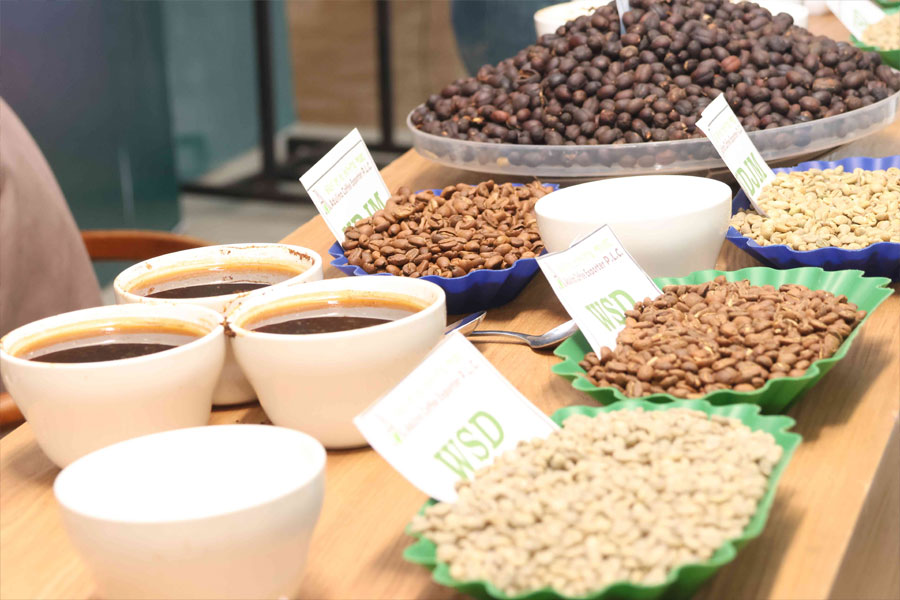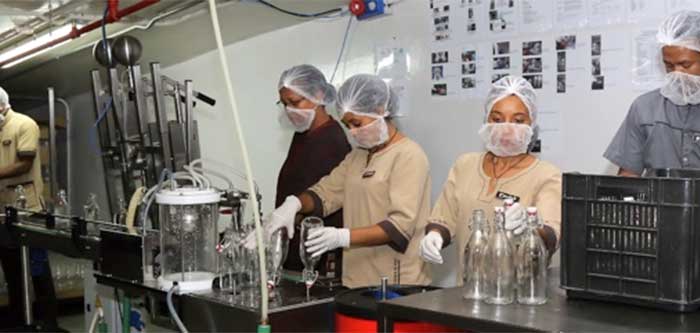
Fortune News | Sep 14,2019
Nov 18 , 2023
By Kidist Yidnekachew
A familiar coffee shop along my daily commute serves a variety of hot and cold beverages, packaged in disposable plastic cups for takeout. Three particular cups frequently occupy a spot on the windowsill. Upon closer inspection, I realised they were empty, leading me to wonder if they were merely decorative or served as a means of displaying their drink menu.
Initially, I assumed they were full, but other thoughts began to creep in as I contemplated the possibility of them being filled and washed after each order. I could envision the barista casually grabbing the cups, rinsing them out, and pouring the desired beverage.
Considering the plastic composition of these cups, I could not help but think about the health risks associated with leaving them out in the midday sun for extended periods. I vaguely recalled reading about the drawbacks of repeatedly using single-use plastic water bottles and cups.
Our lives have become inextricably intertwined with plastic water bottles, these ubiquitous companions that provide a convenient and portable means of quenching our thirst. I probably reach for my water bottle every five minutes, a constant reminder of the dependence. Yet, it is not often I pause to consider the implications.
As guilty as anyone, I often fall into the trap of purchasing new water bottles daily or repeatedly using ones that have seen better days. Though seemingly harmless, this habit can strain wallets and weigh heavily on the conscience.
Constantly lugging water bottles, especially in tiny purses or handbags, can be tiresome. And the guilt of forgetting to purchase a reusable bottle only adds to the frustration.
A quick Google search reveals that most plastic water bottles are made from polyethene terephthalate (PET), a type of plastic that contains substances known to disrupt part of the body which regulates hormones.
Exposure to the substance bisphenol A (BPA) in particular, has been linked to a range of health concerns. It may interfere with the development of reproductive and heart disease not to mention cause different types of cancer.
While these disposable vessels offer convenience, their impact on our health can be significant. Reusing these bottles, in particular, can pose serious health threats due to the chemicals that leach into the water.
Heat, the relentless enemy of PET, weakens the chemical bonds within the plastic, allowing toxins to seep into the liquid within. Those who abandon their water bottles in hot cars or under the unforgiving sun unwittingly expose themselves to an increased risk of contamination.
Acidic beverages, such as fruit juices and sodas, further accelerate leaching where the acidic environment breaks down the plastic, creating pathways for chemicals to infiltrate the liquid. Repeated use only compounds the problem, as scuffs and scratches on the bottle's surface provide additional entry points for toxins.
The health hazards associated with reusable plastic water bottles are undeniable. Bacterial growth, the proliferation of mould and mildew, and the potential for chemical leaching paint a grim picture of the risks.
The time has come to break free from the shackles of convenience and embrace reusable alternatives. Glass, stainless steel, and BPA-free plastic water bottles offer a safer, more sustainable solution, protecting our health and safeguarding the environment for future generations.
PUBLISHED ON
Nov 18,2023 [ VOL
24 , NO
1229]


Fortune News | Sep 14,2019

Radar | Jun 04,2022

Fortune News | Aug 20,2022

Agenda | Oct 13,2024

Radar | Jul 25,2020

Fortune News | Feb 01,2020

Radar |

Fortune News | Feb 08,2020

Fortune News | Jul 27,2019

Agenda | Jul 11,2021

My Opinion | 132120 Views | Aug 14,2021

My Opinion | 128523 Views | Aug 21,2021

My Opinion | 126450 Views | Sep 10,2021

My Opinion | 124061 Views | Aug 07,2021





Dec 22 , 2024 . By TIZITA SHEWAFERAW
Charged with transforming colossal state-owned enterprises into modern and competitiv...

Aug 18 , 2024 . By AKSAH ITALO
Although predictable Yonas Zerihun's job in the ride-hailing service is not immune to...

Jul 28 , 2024 . By TIZITA SHEWAFERAW
Unhabitual, perhaps too many, Samuel Gebreyohannes, 38, used to occasionally enjoy a couple of beers at breakfast. However, he recently swit...

Jul 13 , 2024 . By AKSAH ITALO
Investors who rely on tractors, trucks, and field vehicles for commuting, transporting commodities, and f...

Jul 12 , 2025
Political leaders and their policy advisors often promise great leaps forward, yet th...

Jul 5 , 2025
Six years ago, Ethiopia was the darling of international liberal commentators. A year...

Jun 28 , 2025
Meseret Damtie, the assertive auditor general, has never been shy about naming names...

Jun 21 , 2025
A well-worn adage says, “Budget is not destiny, but it is direction.” Examining t...

Jul 13 , 2025 . By YITBAREK GETACHEW
The Addis Abeba City Revenue Bureau has introduced a new directive set to reshape how...

Jul 13 , 2025 . By BEZAWIT HULUAGER
Addis Abeba has approved a record 350 billion Br budget for the 2025/26 fiscal year,...

Jul 13 , 2025 . By RUTH BERHANU
The Addis Abeba Revenue Bureau has scrapped a value-added tax (VAT) on unprocessed ve...

Jul 13 , 2025 . By NAHOM AYELE
Federal lawmakers have finally brought closure to a protracted and contentious tax de...